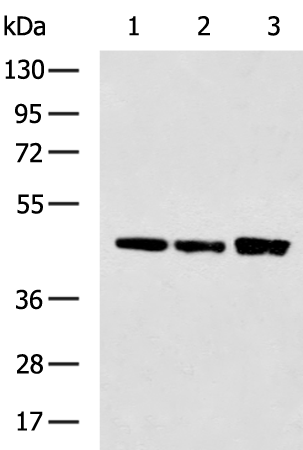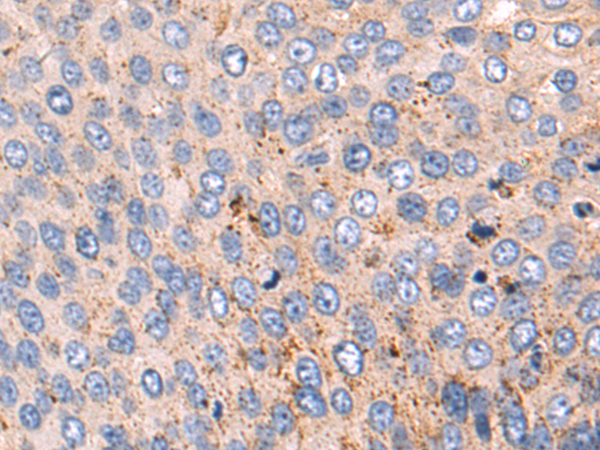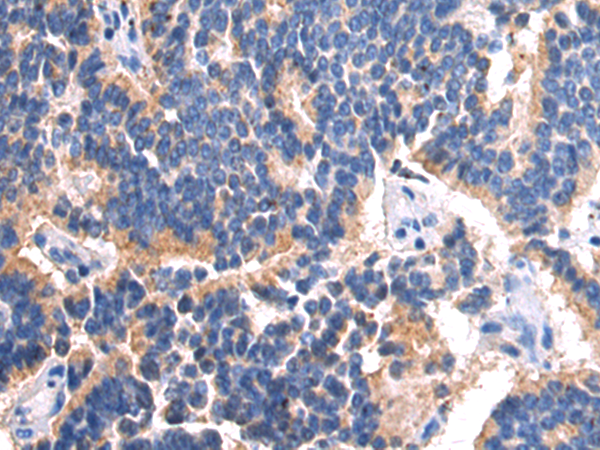


| WB | 咨询技术 | Human,Mouse,Rat |
| IF | 咨询技术 | Human,Mouse,Rat |
| IHC | 1/50-1/200 | Human,Mouse,Rat |
| ICC | 技术咨询 | Human,Mouse,Rat |
| FCM | 咨询技术 | Human,Mouse,Rat |
| Elisa | 1/1000-1/2000 | Human,Mouse,Rat |
| Aliases | CPSD; CLN10; HEL-S-130P |
| WB Predicted band size | 45 kDa |
| Host/Isotype | Rabbit IgG |
| Antibody Type | Primary antibody |
| Storage | Store at 4°C short term. Aliquot and store at -20°C long term. Avoid freeze/thaw cycles. |
| Species Reactivity | Human, Mouse, Rat |
| Immunogen | Synthetic peptide of human CTSD |
| Formulation | Purified antibody in PBS with 0.05% sodium azide and 50% glycerol. |
+ +
以下是3篇关于CTSD(组织蛋白酶D)抗体的参考文献及其摘要概括:
---
1. **文献名称**:*Cathepsin D in breast cancer: Mechanisms and clinical applications*
**作者**:Rochefort H., et al.
**摘要**:该研究探讨了CTSD在乳腺癌中的表达及其预后价值,利用特异性抗体通过免疫组化技术检测肿瘤组织中CTSD的表达水平,发现高表达与肿瘤转移风险相关。
---
2. **文献名称**:*Role of cathepsin D in Alzheimer's disease: Protein degradation and autophagy*
**作者**:Nixon R.A., et al.
**摘要**:研究通过Western blot和免疫荧光技术,使用CTSD抗体分析阿尔茨海默病患者脑组织中的蛋白水解功能,揭示了CTSD在自噬-溶酶体通路中的调控作用及与病理蛋白沉积的关联。
---
3. **文献名称**:*Development and validation of a novel cathepsin D-specific monoclonal antibody for cancer diagnostics*
**作者**:Zhang L., et al.
**摘要**:该文献报道了一种新型CTSD单克隆抗体的开发与验证,通过ELISA、免疫印迹及组织芯片分析证实其高特异性和灵敏度,适用于多种癌症的临床诊断。
---
如需扩展,可补充更多实验技术或疾病相关研究文献。
CTSD (Cathepsin D) antibodies are essential tools in studying the lysosomal aspartic protease Cathepsin D, which plays dual roles in cellular protein degradation and disease pathogenesis. CTSD is synthesized as an inactive pro-enzyme, activated in acidic environments like lysosomes, and regulates processes such as apoptosis, tissue remodeling, and antigen presentation. Dysregulation of CTSD is implicated in cancer, neurodegenerative disorders, and inflammatory diseases. In cancer, elevated CTSD levels correlate with tumor progression, metastasis, and poor prognosis, particularly in breast cancer, where it serves as a prognostic biomarker. In Alzheimer’s disease, CTSD contributes to amyloid-β peptide metabolism, influencing plaque formation.
CTSD antibodies are widely used in research (e.g., Western blot, immunohistochemistry, ELISA) to detect expression patterns, subcellular localization, and enzymatic activity. Monoclonal and polyclonal variants target specific epitopes, enabling precise investigation of CTSD’s role in disease mechanisms. Clinically, these antibodies aid in histopathological diagnostics, distinguishing disease subtypes and assessing therapeutic responses. Recent studies also explore CTSD as a therapeutic target, with inhibitors and antibody-based strategies in development for cancer and neurodegeneration. Despite challenges like cross-reactivity, optimized CTSD antibodies remain critical for advancing molecular pathology and targeted therapies.
×